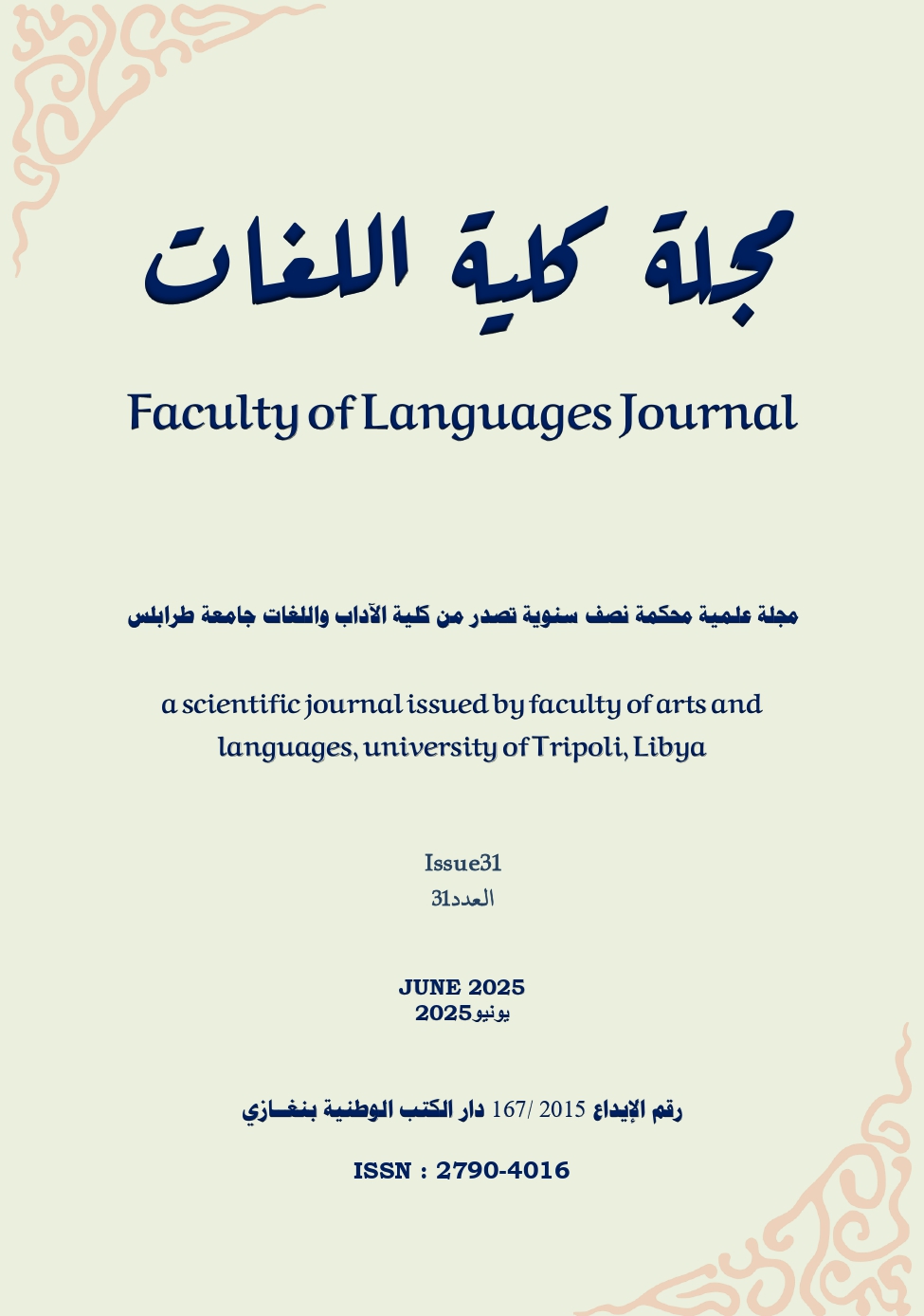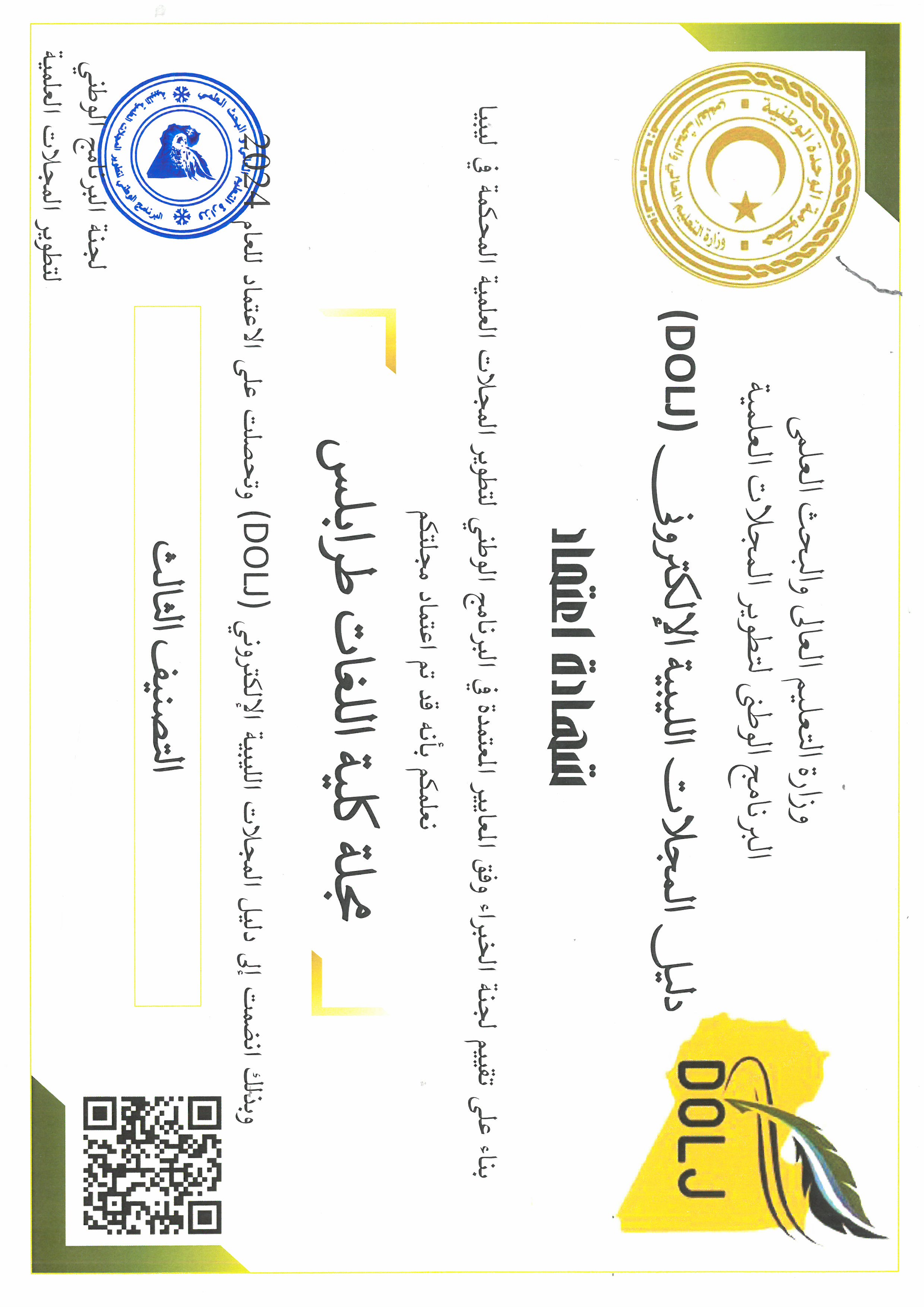An analysis of short stories in ELT coursebooks for teaching vocabulary at the intermediate and upper-intermediate levels
الكلمات المفتاحية:
اللغة الانجليزية، كتب تعليم اللغة الإنجليزية، القصص القصيرة، المفردات، التدريسالملخص
تهدف هذه الدراسة إلى تحليل وتحديد فعالية القصص القصيرة في تدريس المفردات في كتب تعليم اللغة الإنجليزية للمستويين المتوسط وفوق المتوسط. يهدف الجزء الأول من البحث إلى تعريف المفردات وشرح العلاقة النظرية بين القصص القصيرة وتعلم الكلمات والمفردات، مع تقديم ملخص لدراسات وبحوث سابقة في هذا المجال. ثم تقدم المنهجية، ومجموعة النصوص، وطريقة جمع وتحليل البيانات. الجزء الثاني من الدراسة يحلل ويقيم التمارين والأنشطة المختلفة المرفقة مع كل قصة بناءً على فعاليتها في تدريس المفردات. واستنتجت الدراسة أن معظم التمارين والأنشطة تساهم في اكتساب وتعلم الكلمات والمفردات. ومع ذلك، هناك حاجة إلى مزيد من البحوث التي تشمل المتعلمين لتأكيد هذه النتائج.
المراجع
Abdalrahman, Karwan. (2023). Teaching and Learning Vocabulary through Short Stories. Canadian Journal of Language and Literature Studies. 7-15. 10.53103/cjlls.v2i2.35.
Bhatti, M. S., Arshad, A., & Mukhtar, R. (2020). Improving Vocabulary through Short Stories At Elementary Level. Organization & Advisory Committee.
Brown, R, Waring, R, Donkaewbua, S. (2008). Incidental vocabulary acquisition from reading, reading-while-listening, and listening to stories. Reading in a Foreign Language, ISSN 1539-0578, Volume 20, Number 2, pp. 136–163.
Cambridge Dictionary. Vocabulary definition. Retrieved from https://dictionary.cambridge.org/dictionary/english/vocabulary
Charalambous, A. C. (2011). The Role and Use of coursebooks in EFL. Online Submission.
Day, R. R., and Park, J. S. (2005). Developing Reading Comprehension Questions. Reading in a foreign language, 17(1), 60-73.
Diamond, L. & Gutlohn, L. (2006). Teaching Vocabulary, Retrieved from https://www.readingrockets.org/article/teaching-vocabulary
Diane Larsen-Freeman and Marti Anderson, (2011). Techniques and Principles in Language Teaching, third edition, Oxford University Press.
Dunmore, D. (1989). Using contextual clues to infer word meaning: An evaluation of current exercise types. Reading In a Foreign Language, 6(1), 337-347.
Elley, W. B. (1989). Vocabulary acquisition from listening to stories. Reading research quarterly, 174-187.
Greene Brabham, E., and Lynch-Brown, C. (2002). Effects of teachers' reading-aloud styles on vocabulary acquisition and comprehension of students in the early elementary grades. Journal of Educational Psychology, 94(3), 465.
Hamilton, H. (2012). The efficacy of dictionary use while reading for learning new words. American Annals of the Deaf, 157(4), xx.
Hashemzadeh, M. (2012). The Effect of Exercise Types on EFL Learners’ Vocabulary Retention. Theory and Practice in Language Studies, 2, 1717–1727. https://doi.org/10.4304/tpls.2.8.1716-1727
Hilal İnal, Abdulkadir Cakir, (2014). Story-based Vocabulary Teaching, Procedia - Social and Behavioral Sciences, Volume 98, Pages 675-679, ISSN 1877-0428.
Horst, M. (2005). Learning L2 vocabulary through extensive reading: A measurement study. The Canadian Modern Language Review, 61, 355–382.
Kacani, L., and Cyfeku, J. (2015). Developing EFL vocabulary through speaking and listening activities. Academic Journal of Interdisciplinary Studies, 4(3 S1), 390-390.
Khalid, G. M. M. (2023). The Effect of Reading Short Stories on Enhancing EFL Vocabulary Acquisition of Secondary Stage Students and their interest. Journal of The Faculty of Education- Mansoura University, 124(4), 177–194. https://doi.org/10.21608/maed.2023.359307
Merriam-Webster. (n.d.). Vocabulary. In Merriam-Webster.com dictionary. Retrieved from https://www.merriam-webster.com/dictionary/vocabulary
Mohd Tahir, M. H., and Mohtar, T. (2016). The Effectiveness of using Vocabulary Exercises to Teach Vocabulary to ESL/EFL Learners. Pertanika Journal Of Social Sciences and Humanities, 24(4).
Murdoch, G. (2002). Exploiting well-known short stories for language skills development. IATEFL LCS SIG Newsletter 23: 9-17.
Nagy, W. (1995). On the role of context in first- and second-language vocabulary learning. University of Illinois at Urbana-Champaign.
Nation, P., and Mark Newton, J. (1996, January). Vocabulary learning and speaking activities. English teaching forum.
Noura M.A Tomize, (2013). Investigating the Impact of Extensive Reading on Reading Comprehension of Sixth Graders at Hafssa Elementary School in Hebron, Hebron University, Palestine.
Paribakht, T. S. and Wesche, M. (1994). Enhancing vocabulary acquisition through reading: A hierarchy of text-related exercise types. Paper presented at the AAAL for Applied Linguistics, Baltimore.
Phil Williams (2015), How to rewrite English sentences using word order. Retrieved from https://englishlessonsbrighton.co.uk/how-to-rewrite-english-sentences-using-word-order/
Rachmawati, R. J. The Effectiveness Of Using Word Matching Games On Students’vocabulary (A Quasi-experimental Study at the Eighth Grade of MTsN 1 South Tangerang in Academic Year 2019/2020) (Bachelor's thesis, Jakarta: FITK UIN Syarif Hidayatullah Jakarta).
Radzuwan Bin Ab Rashid, (2011). Vocabulary Learning among Less Proficient Young Adults Using Children’s Stories, MEXTESOL Journal, Volume 35, Number 1. Retrieved from http://www.mextesol.net/journal/public/files/572ab1f5e6f8e33573b3cec5145165e4.pdf
Roberts, A. (2015), Learning vocabulary through reading, Retrieved from https://www.teachingenglish.org.uk/blogs/rachael-roberts/rachael-roberts-learning-vocabulary-through-reading
Tarakçıoğlu, A., & Tunçarslan, H. (2014). The effect of short stories on teaching vocabulary to very young learners (aged 3-4-year): A suggested common syllabus. Journal of Language and Linguistic Studies, 10(2).
UKEssays, (2018). The Importance Of Teaching And Learning Vocabulary English Language Essay. Retrieved from https://www.ukessays.com/essays/english-language/the-importance-of-teaching-and-learning-vocabulary-english-language-essay.php?vref=1
Webb, S. (2008). The effects of context on incidental vocabulary learning. Reading in a Foreign Language, 232–245.
William E. Nagy, (1988). Vocabulary Instruction and Reading Comprehension, University of Illinois at Urbana-Champaign, Illinois, USA. Retrieved from https://www.ideals.illinois.edu/bitstream/handle/2142/17756/ctrstreadtechrepv01988i00431_opt.pdf

التنزيلات
منشور
كيفية الاقتباس
إصدار
القسم
الرخصة
الحقوق الفكرية (c) 2025 Faculty of Languages Journal-Tripoli-Libya

هذا العمل مرخص بموجب Creative Commons Attribution 4.0 International License.
 https://orcid.org/0009-0002-8251-5878
https://orcid.org/0009-0002-8251-5878




